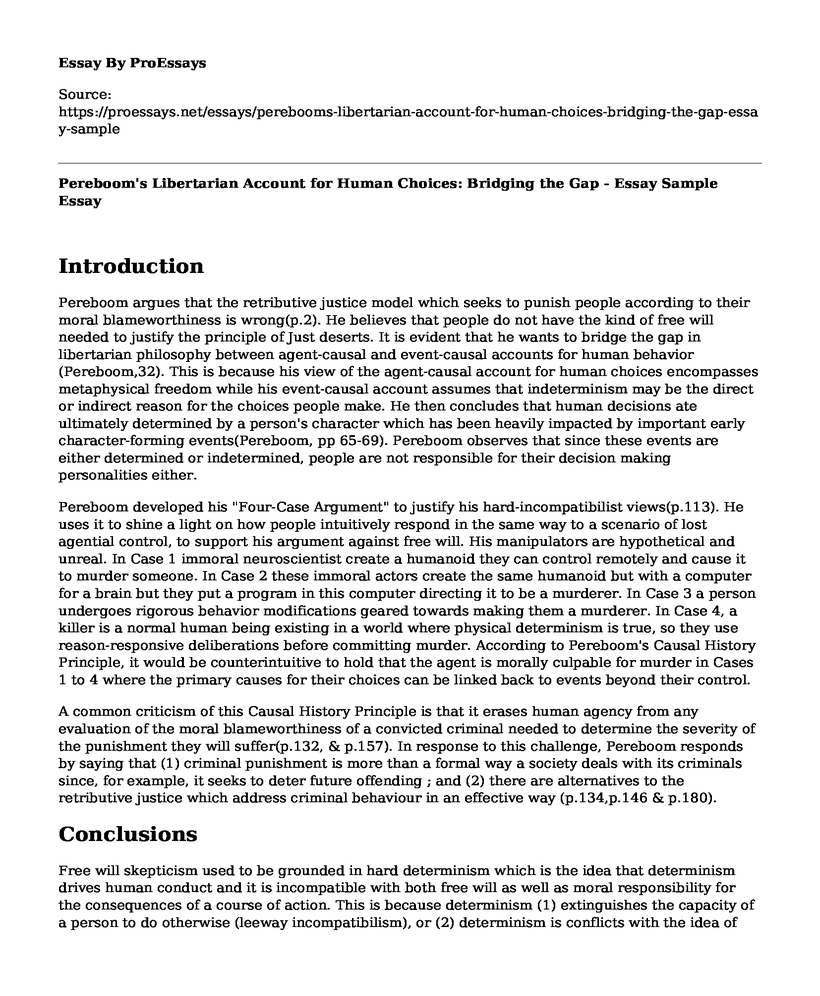Introduction
Pereboom argues that the retributive justice model which seeks to punish people according to their moral blameworthiness is wrong(p.2). He believes that people do not have the kind of free will needed to justify the principle of Just deserts. It is evident that he wants to bridge the gap in libertarian philosophy between agent-causal and event-causal accounts for human behavior (Pereboom,32). This is because his view of the agent-causal account for human choices encompasses metaphysical freedom while his event-causal account assumes that indeterminism may be the direct or indirect reason for the choices people make. He then concludes that human decisions ate ultimately determined by a person's character which has been heavily impacted by important early character-forming events(Pereboom, pp 65-69). Pereboom observes that since these events are either determined or indetermined, people are not responsible for their decision making personalities either.
Pereboom developed his "Four-Case Argument" to justify his hard-incompatibilist views(p.113). He uses it to shine a light on how people intuitively respond in the same way to a scenario of lost agential control, to support his argument against free will. His manipulators are hypothetical and unreal. In Case 1 immoral neuroscientist create a humanoid they can control remotely and cause it to murder someone. In Case 2 these immoral actors create the same humanoid but with a computer for a brain but they put a program in this computer directing it to be a murderer. In Case 3 a person undergoes rigorous behavior modifications geared towards making them a murderer. In Case 4, a killer is a normal human being existing in a world where physical determinism is true, so they use reason-responsive deliberations before committing murder. According to Pereboom's Causal History Principle, it would be counterintuitive to hold that the agent is morally culpable for murder in Cases 1 to 4 where the primary causes for their choices can be linked back to events beyond their control.
A common criticism of this Causal History Principle is that it erases human agency from any evaluation of the moral blameworthiness of a convicted criminal needed to determine the severity of the punishment they will suffer(p.132, & p.157). In response to this challenge, Pereboom responds by saying that (1) criminal punishment is more than a formal way a society deals with its criminals since, for example, it seeks to deter future offending ; and (2) there are alternatives to the retributive justice which address criminal behaviour in an effective way (p.134,p.146 & p.180).
Conclusions
Free will skepticism used to be grounded in hard determinism which is the idea that determinism drives human conduct and it is incompatible with both free will as well as moral responsibility for the consequences of a course of action. This is because determinism (1) extinguishes the capacity of a person to do otherwise (leeway incompatibilism), or (2) determinism is conflicts with the idea of moral agency (source incompatibilism). Contemporary skeptics of free will like Pereboom have moved away from hard determinism and they now offer an agnostic defense of it. Be that as it may, modern skeptics have not walked back the basic hypothesis of classic hard determinism that human conduct and character are created by factors beyond an individual's control. Hence people can never be completely morally responsible for their acts or omissions to make them truly deserving of blame or praise.
Works Cited
Pereboom, Derk. Free Will, Agency, and Meaning in Life. Oxford: Oxford University Press,2014.
Cite this page
Pereboom's Libertarian Account for Human Choices: Bridging the Gap - Essay Sample. (2023, Feb 27). Retrieved from https://proessays.net/essays/perebooms-libertarian-account-for-human-choices-bridging-the-gap-essay-sample
If you are the original author of this essay and no longer wish to have it published on the ProEssays website, please click below to request its removal:
- International Crime Witness Essay
- Research Paper on Private Prisons in the US
- Research Paper on Legal Issues in Correction
- Essay Sample on Bugsy & Little Man: Uncovering the Criminal Underworld of Meyer Lansky
- Conflict Resolution Between Employees & Employers: Unions vs. Arbitration - Case Study
- Immigration to the United States: Overview of Legal and Illegal Migration - Essay Sample
- Court Participants - Free Report Example







